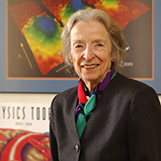- Details
-
Published: Tuesday, February 14 2017 11:30
The W. J. Carr Lecture Series on Superconductivity and Advanced Materials was established by Dr. James L. Carr ' 89, and attracts some of the best researchers in this field each year. This year's distinguished Lecturer is Dr. Stuart Parkin, Director of the Max Planck Institute of Microstructure Physics and Professor at the Institute of Physics of the University of Halle-Wittenberg. Parkin is a pioneer in the science and application of spintronic materials, and has made discoveries into the behavior of thin-film magnetic structures that were critical in enabling recent increases in the data density and capacity of computer hard-disk drives. For these discoveries, he was awarded the 2014 Millennium Technology Prize.
Prof. Parkin will present both a department colloquium and technical seminar. His colloquium will be presented on Tuesday February 28th at 4pm in room 1410 of the John S. Toll Physics Building.
Title: Beyond charge currents: spin and ion currents for future computing technologies
Abstract: The era of computing technologies based on charge currents is coming to an end after more than 40 years of exponential increases in computing power that have been largely based on shrinking devices in two dimensions. A new era of "Beyond charge!" will evolve over the next decade that will likely be based on several new concepts. Firstly, devices whose innate properties are derived not from the electron's charge but from spin currents and from ion currents. In some cases new functionality will arise that can extend charge based devices but in other cases fundamentally new computing paradigms will evolve. Secondly, devices will inevitably become three-dimensional: novel means of constructing devices, both from bottom-up and top-down, will become increasingly important. Thirdly, bio-inspired devices that may mimic the extremely energy efficient computation systems in the biological world are compelling. In this talk I will discuss possible spintronic and ionitronic devices and how they may lead to novel computing technologies.
Bio: Professor Stuart Parkin's research interests include oxide thin film heterostructures, high-temperature superconductors, and, magnetic thin film structures and spintronic materials and devices for advanced sensor, memory, and logic applications. Parkin's discoveries in magneto-resistive thin film structures enabled a more than 1000 fold increase in the storage capacity of magnetic disk drives for which he was awarded the Millennium Technology Award from the Technology Academy Finland in 2014. Most recently, Parkin has proposed and demonstrated a novel storage-class memory device, "Racetrack Memory", that is an innately 3D solid-state device with the storage capacity of a disk drive but with much higher performance and reliability. Parkin's other major research interest is cognitive - bio-inspired materials - that could enable ultra-low power computing technologies. Parkin is a Fellow/Member of several Academies, including: the Royal Society (London), National Academy of Sciences (USA), National Academy of Engineering (USA), German National Academy of Science - Leopoldina, Royal Society of Edinburgh, Indian Academy of Sciences, and TWAS, the academy of sciences for the developing world. Parkin is the recipient of numerous awards and honors including, the American Physical Society International Prize for New Materials, the Europhysics Prize for Outstanding Achievement in Solid State Physics, and the American Institute of Physics (AIP) Prize for Industrial Application of Physics. Parkin has received Honorary Doctorates from RWTH Aachen, Eindhoven University of Science and Technology, University of Regensburg, and University of Kaiserslautern. Parkin received the IEEE Daniel E. Noble Award for his work on MRAM, the IUPAP Magnetism Prize and Neel Medal for outstanding contributions to the science of magnetism, the APS David Adler Lectureship Award, the von Hippel Award from the Materials Research Society, the Swan Medal of the Institute of Physics (London), the Millennium Technology Prize and an Alexander von Humboldt Professorship − International Award for Research (2014).

